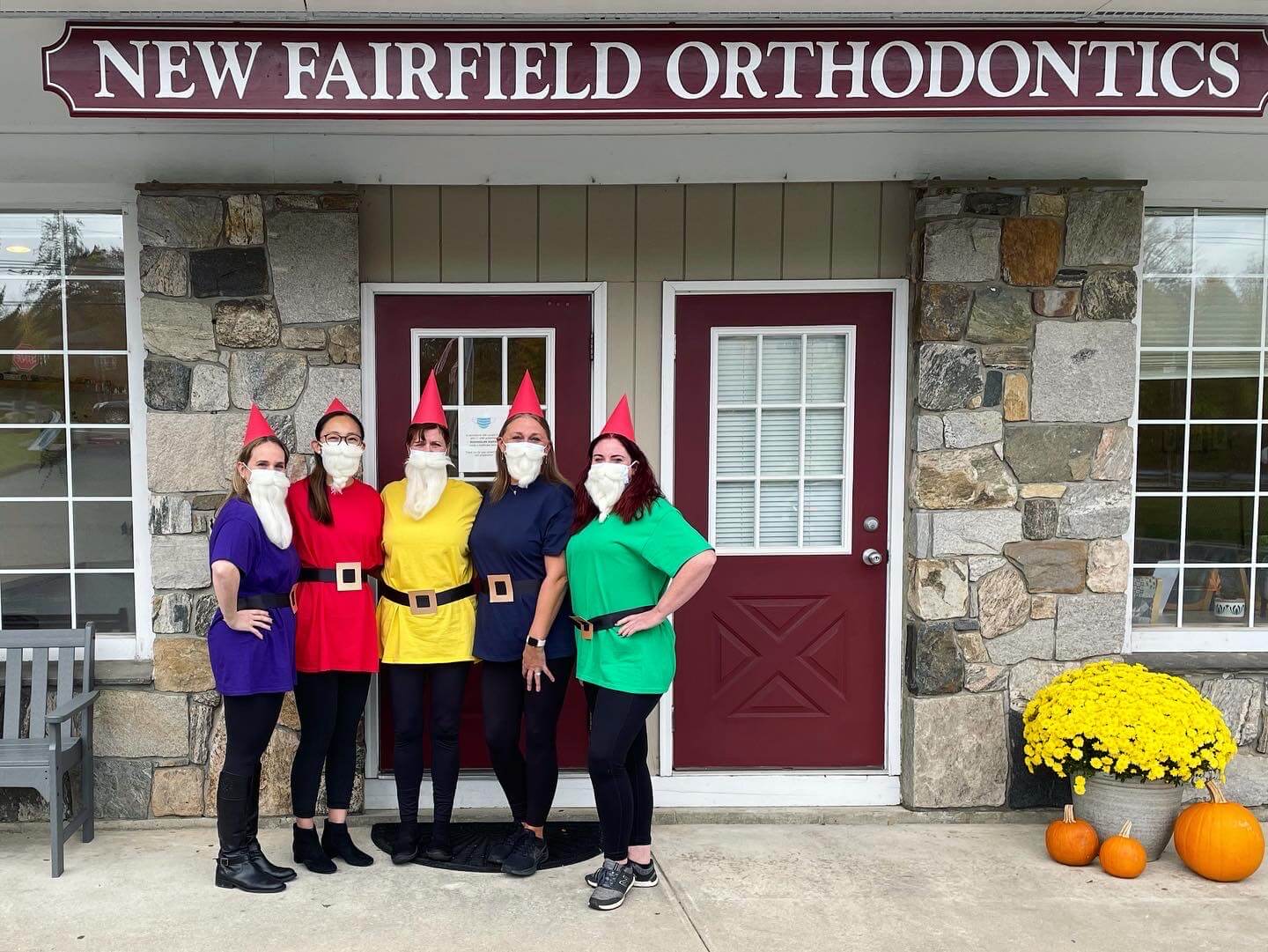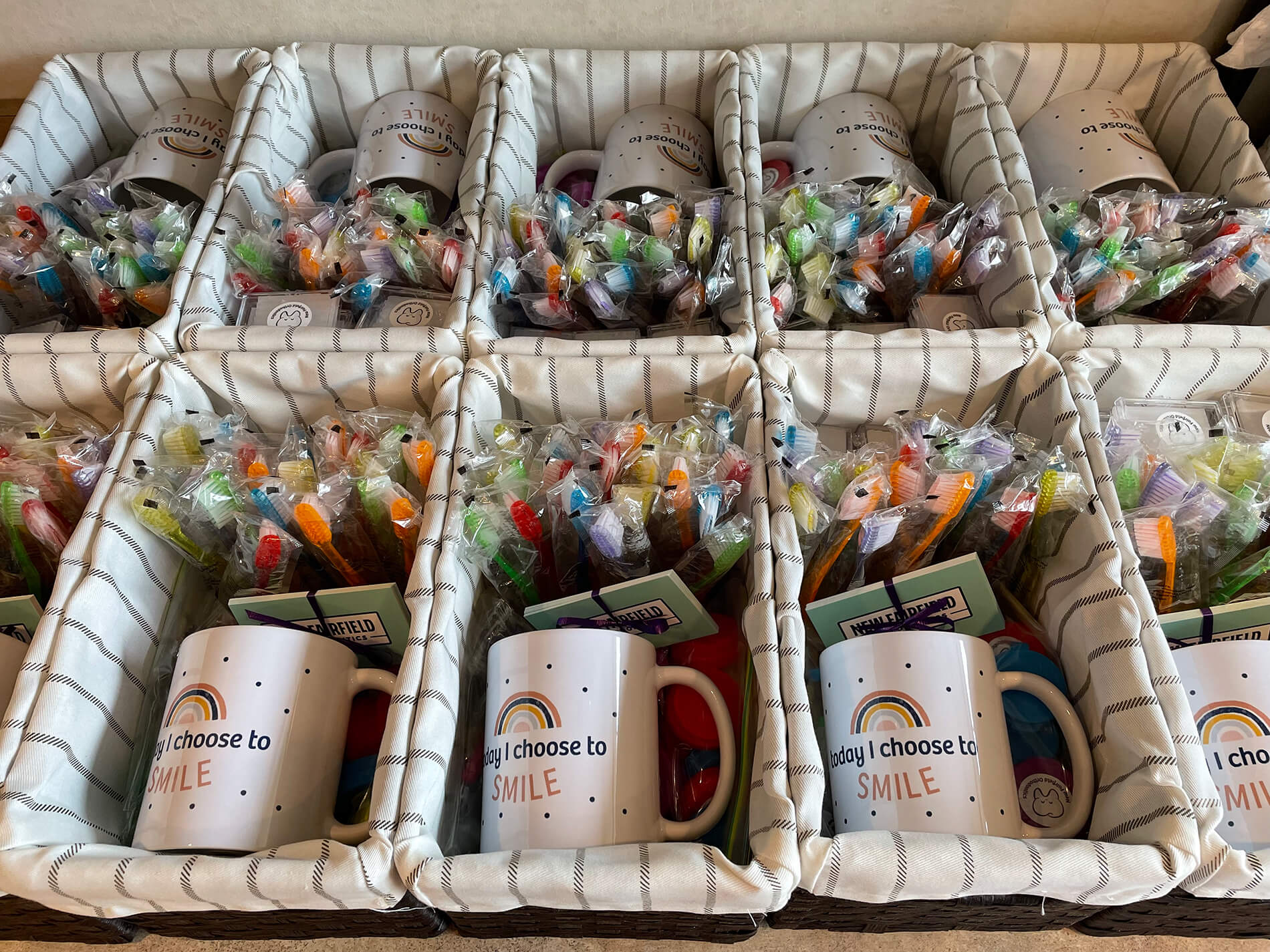Community Blog
One Size Does Not Fit All: Toothbrushes
February 2022

When walking down the oral care products aisle, the number of choices can be overwhelming. It can be easy to fall into the trap of purchasing "the same old thing" because exploring different options without guidance is daunting and frustrating. Here are a few tips to keep in mind the next time you are in the market for a new brush and want to make an improvement for your mouth that won't break the bank.
- Always SOFT (or extra soft). It has always been a mystery to dentists and hygienists why oral care companies decide to manufacture anything other than the soft toothbrush. Soft toothbrush bristles are the correct firmness to efficiently remove plaque while gentle enough to prevent damage to enamel and gum tissue. Extra soft can be useful in specific situations where gum tissue may be extra sensitive due to a condition or post-dental treatment; most dental professionals will specifically prescribe it for patients who would benefit from the gentler bristles.
- Bigger is not always better. In fact, for kids and teens, a smaller brush head is almost always better. Smaller brush heads allow you to more easily access awkward areas which are often neglected areas of the mouth. In adults, this is commonly behind the front teeth (upper and lower) and the last molars in the back of the mouth. In teenagers who may be undergoing orthodontic treatment, the smaller brush head fits in hard to reach places around wires or other appliances in the mouth that can trap plaque. For kids just starting to brush independently, a smaller brush is a great training tool for focusing on only a couple teeth at once and taking the time to brush every tooth.
- New brush head every 3 months. Though your brush head may "look OK" after 3 months of use, it has likely become a petri dish of bacteria and other germs. Bacteria are the culprits of most damaging oral conditions such as cavities, gingivitis, and periodontitis. If your toothbrush head is past is expiration, keep in mind that it may be introducing bacteria back into your mouth every time you brush. In addition, prolonged use distorts the bristles in toothbrush heads, reducing the efficiency with which they remove plaque.
A common question dental professionals are often asked is "manual or electric toothbrush"? Studies show that both are equally effective when used properly. Those last three words are key because we often find ourselves distracted while brushing, not brushing for a full two minutes, or otherwise not practicing accurate brushing technique every single time. This is where an electric toothbrush can pick up some of the slack and perform better than regular manual brushes.
Lastly, keeping a great toothbrush routine doesn't have to be expensive or a chore. There are many subscription companies that offer great products at a reasonable price, delivered to your home every 3 months. At NFO, we partner with Quip to provide our patients with an effective and reliable toothbrush at a fantastic price. If you are in the market for a new brush, check out Quip and get your first toothbrush refill for free: www.getquip.com/nfobrush.
Happy brushing!
FSAs & HSAs: Planning for Savings
December 2021, Town Tribune Article

December is already upon us. The sun is setting earlier, and snow flurries have been spotted! As we excitedly plan for the new year, don’t forget to check on your health spending and make sure you’re taking full advantage of your tax-free “Health Savings Accounts” (HSAs) and “Flexible Spending Accounts” (FSAs).
First and foremost, if you have cash in an FSA account, start making appointments with your healthcare providers right away. FSAs are a great tool for managing regular healthcare expenses, but anything left in the FSA at the end of the year is at risk of disappearing for good. Keep in mind that others are in the same boat, so sometimes it can be hard to get in that last minute appointment. Great options for spending last minute funds are a new pair of prescription glasses or starting Invisalign treatment!
If you have money in an HSA, time is on your side; that money will be yours forever. HSAs are only included in certain types of medical insurance plans known as high-deductible plans, and you’ll only be able to contribute to an HSA while enrolled in that type of plan. If you have access to an HSA, it’s always a great idea to save into it while you can. You can always use the funds on future healthcare expenses.
Tax-free health accounts are a great way to make every dollar go further. $100 before tax quickly becomes only $90, $80, or $70 after both state and federal taxes. Many FSAs and HSAs require you to decide on your contribution amounts for 2022 in December of 2021. If you know a large healthcare expense is coming in the next year, including dental care such as orthodontic treatment, plan ahead so you don’t miss your chance to save!
Hangin’ with My Gnomies
October 2021

We had a fantastic Halloween this year as the Gnome Crew, check out more photos on Facebook and Instagram!
Easy Tips for a Whiter Smile
August 2021, Town Tribune Article

Looking to improve your smile with whitening at home? With thousands of different products and DIY fads out there these days, it can be difficult to know what is effective and trustworthy. Achieving and maintaining a brighter whiter smile at home can be simple and safe by following the American Dental Association (ADA) guidelines.
- What works:
- Brushing twice a day with a gentle whitening fluoride toothpaste
- Flossing once a day
- Rinsing thoroughly with water after eating staining foods (coffee, tea, etc)
- Using ADA accepted OTC whitening products
- Not smoking or using chewing tobacco
- What doesn’t work:
- Charcoal or abrasive scrubs (these can damage your enamel)
- Oil and spice rinses/pulls
- Natural fruit or vinegar scrubs/rinses (these can wear away your enamel and potentially cause cavities)
When shopping at the pharmacy, any product with the ADA seal of acceptance is backed by extensive research and is considered safe and effective. If you are unsure about a specific at-home whitening product, just ask your local dental professional. However, it is important to remember that the easiest solution is often times the best. A great daily oral hygiene routine can go a long way in keeping your pearly whites shining!
School SOS Kits
August 2021

To help make sure all our patients have what they need for the start of the new school year, we’ve provided SOS kits to our local school nurses. Supplied with wax, tooth chests, toothbrushes, and other goodies, these kits will help our awesome school nurses with the tools they need to address a school day orthodontic emergency!
Team Celebration - 6 Months!
June 2021

Enjoyed incredible food and fun at Stanziato’s, a local favorite of the group. Celebrating 6 months since the transition to New Fairfield Orthodontics and working with this incredible team!
Keeping Your Breath Fresh During Allergy Season
May 2021, Town Tribune Article

Spring is always a welcome season after long New England winters. Blooming trees, green grass, and fresh flowers are a refreshing sight, but also a warning that allergy season has arrived. Allergies are the daily nuisance that many of us are intimately familiar with for several months in the spring season, but many people don’t know that their allergies are also the cause of their seasonal bad breath. The good news is that there are a few simple solutions that are easily accessible that can prevent and correct this unwanted side effect of seasonal allergies.
During allergy season, regular brushing and flossing may not be enough to ward off bad breath. Saliva is essential to a keeping our mouths healthy, so even in a clean mouth, lack of saliva and dry mouth can promote growth of bacteria that produce bad breath odors. Mouth breathing occurs naturally at night and is often the cause of classic “morning breath”. But during allergy season, mouth breathing often becomes excessive and creates an ideal environment for bad breath bacteria. In addition, many allergy medications work by reducing secretions (watery eyes, running nose, etc.) and cause dry mouth as a major side effect.
Since dry mouth is the main culprit of seasonal allergy induced bad breath, creating more saliva is the key to combating it. Xylitol is a natural sugar substitute that promotes saliva secretion and also, according to some research, decreases the incidence of cavities. Xylitol can be found in mints and lozenges, but xylitol gum is particularly effective in fighting bad breath because the act of chewing also independently encourages saliva production. Although naturally inducing saliva production is preferred, there are also saliva replacement products that can help alleviate dry mouth and the associated bad breath. Often packaged as a mouth rinse or spray, these products help mimic the protective effects of saliva.
There are many different xylitol and saliva replacement products on the market that are effective in fighting seasonal allergy induced dry mouth and bad breath. Looking for the American Dental Association (ADA) seal can guide your search for a trustworthy product and always make sure that the product is sugar-free. So, if your seasonal allergies are giving you less than spring fresh breath, the solution could be as simple as chewing a couple sticks of sugar free gum!